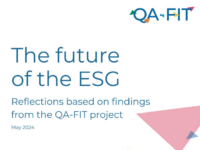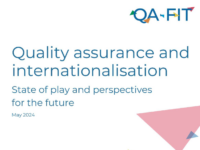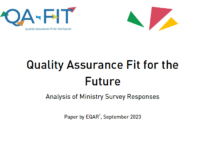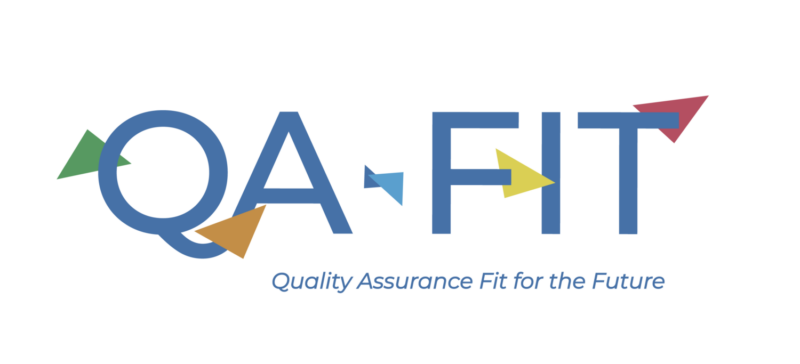This paper, based on the main conclusions drawn from the collected data and consultations with stakeholders,
Quality Assurance Fit for the Future (QA-FIT)
One of the main questions that will be addressed during the QA-FIT project is whether the ESG are ready for the future, and if not, how to make sure they are.
Various stakeholders had appealed to make further revisions to the ESG in order to reflect recent developments in higher education, allow more room for innovation in quality assurance in the future and facilitate a more flexible application of common standards as well as room for development of alternative approaches.
To this end, the QA-FIT project aims to gather comprehensive evidence and reflect if and how the current EHEA framework of the ESG is perceived to limit the responsiveness of quality assurance to trends and innovations in higher education.
EQAR will be responsible for preparing, analysing and disseminating (via webinar and other means) the surveys for, and handling the consultation with, ministries of higher education. EQAR will additionally organise the final policy event that will disseminate the key policy messages, also considering the outcomes of the Bologna Process Ministerial Conference.

The future of the ESG: reflections based on findings from the QA-FIT project
This paper draws on the data collected with the objective of identifying and analysing commonalities and divergences in the perception of the ESG by different stakeholder groups,

Quality assurance and internationalisation: state of play and perspectives for the future
This paper explores the state of implementation of the various quality assurance tools that support internationalisation,

Analysis of Ministry Survey Responses
The paper is part of a comprehensive exercise to collect concrete evidence on the scope and implementation of internal and external quality assurance policies and practices, addressing emerging issues beyond the current scope of the ESG.

Presentations & webinar on survey results
The presentations below on the preliminary survey results were given at the EQAR General Assembly in front of a live audience and recorded as a webinar (also below).
Webinar "A Future-Proof Quality Assurance Framework for the EHEA”
In the following recording, Melinda Szabo, Deputy Director of EQAR, presents an overview of the key findings from the QA-FIT surveys, followed by questions and a discussion. This webinar was given before a live audience of stakeholders of national ministries in Stockholm at the EQAR General Assembly on 10 May 2023.
- Conduct a comprehensive mapping exercise of the state of play of internal and external quality assurance in the EHEA.
- Take a critical look at the ESG and see how they have been adapted to different contexts.
- Explore how quality assurance activities are addressing recent and emerging developments in higher education including activities that go beyond the focus of the ESG and that use innovative approaches.
- Gather perspectives on the future of quality assurance in the EHEA.
- Surveys to the main quality assurance stakeholders, namely higher education institutions, students, quality assurance agencies, and ministries.
- Papers to present findings from the surveys.
- Webinars, organised in conjunction with the publication of the papers.
- Focus groups to discuss in detail some of the matters arising from the surveys.
- Final publication and policy recommendations.
- Final conference in Brussels.
- ENQA – European Association for Quality Assurance in Higher Education, Belgium
- ESU – European Students’ Union, Belgium
- EUA – European University Association, Belgium
- EURASHE – European Association of Institutions in Higher Education, Belgium
- EQAR – European Quality Assurance Register for Higher Education, Belgium
- ANOSR – National Alliance of Student Organisations in Romania, Romania
- FINEEC – Finnish Education Evaluation Centre, Finland
- IUA – Irish Universities Association, Ireland
- MOESGE (associate partner) – Ministry of Education and Science of Georgia, Georgia

